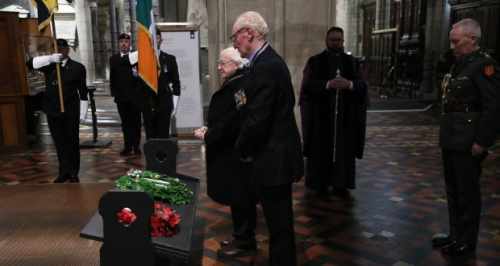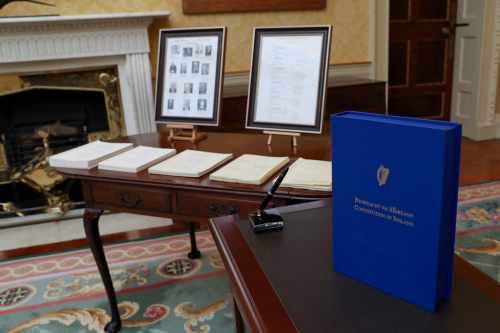Speech at a reception to mark the 50th Anniversary of the Irish Family Planning Association
Áras an Uachtaráin, Friday, 1 November, 2019, 3pm
A chairde,
Tá fíor-áthas orm fáilte a chuir romhaibh go leir ag ceiliúradh leath-chéad bliain Chumann Pleanáil Clainne na hÉireann.
[I am delighted to welcome you here today to a reception to mark the 50th anniversary of the Irish Family Planning Association.]
May I begin by thanking Niall Behan, Chief Executive of the Irish Family Planning Association, for inviting me to mark the organisation’s anniversary, coming as it does at a unique time with three significant anniversaries for the advancement of sexual, reproductive health and gender equality in Ireland.
In addition to the organisation’s 50th anniversary, 2019 also marks the 50th anniversary of the founding of the United Nations Family Planning Agency.
Under the auspices of that organisation, the international community came together in Cairo 25 years ago for the International Conference on Population and Development, a landmark event that attracted some 20,000 delegates from various governments, agencies and non-governmental organisations.
The conference achieved consensus on four goals: universal education, reduced infant and child mortality, reduced maternal mortality, and improved access to reproductive and sexual health services, including family planning.
The Irish Family Planning Association is perhaps Ireland’s most well-known sexual-health provider, providing contraception, pregnancy counselling, abortion care, sexual and reproductive health services and training, in its Dublin city centre and Tallaght clinics. The organisation promotes the right of all people to sexual and reproductive health information, as well as dedicated, confidential and affordable healthcare services on a not-for-profit basis.
Established by seven volunteer doctors and nurses in 1969, the Irish Family Planning Association has been to the fore in setting the agenda for sexual and reproductive health and rights both nationally and internationally since then.
Motivated by a commitment to social justice, these volunteers refused to be passive in the face of the suffering to women and girls in Dublin’s inner city caused by the blanket prohibition on contraception at the time.
I wish to pay tribute to these founding volunteers: Dr Dermot Hourihane, Dr Jim Loughran, Marie Mullarney, Yvonne Pim, Dr Michael Solomons, Dr Robert Towers and Dr Joan Wilson.
Le calmacht, i dtréimhse coiméideach sriantach, bhun na daoine cróga seo cumann, chun seirbhísí do mhná a chuir ar fáil nach raibh teacht orthu, agus chun feachtas áititheach a bhunú chun na dlíthe a leasú. Bhí siad ag obair i limistéar liath an dlí. Tá an dúshlánacht mar fréamhnóta ag eiteas an chumainn as sin amach.
[These individuals took the brave step at the time, a time of suffocating conservatism in Ireland, of establishing an organisation both to provide services that were denied to women, and to advocate persuasively for reform of the law. They were operating at the edges of the law. The defiance they demonstrated has defined the organisation’s ethos ever since.]
Indeed, the organisation’s very existence was a serious challenge to the State’s obstruction of what was the necessary and rights-based provision for women. It was a time when the State was effectively succumbing to pressure having deprived women of rights in relation to their health. Thus, the Irish Family Planning Association was constantly under attack yet your story is one of triumph as well as struggle.
Bhí caitheamh agus cáineadh oraibh, ach seas sibh an fód.
With a strong track record in providing high-quality medical, counselling and education services, the Irish Family Planning Association quickly became a respected authority on sexual and reproductive health and rights, working with partner organisations and civil society to raise awareness of the importance of sexual and reproductive health and rights at home and all over the world.
As every advance in reproductive rights and health in Ireland was achieved, the Irish Family Planning Association was at the vanguard. Even as reproductive choice was suppressed, you continued with the work of providing care – including the supply of the contraceptive pill in exchange for a donation in the 1970s, selling condoms in a well-known Dublin record shop in the 1980s, opening clinics in marginalised communities, and pioneering pregnancy counselling and abortion information.
As a former member of the All-Party Oireachtas Interest Group on Sexual and Reproductive Health and Rights – for which the Irish Family Planning Association provided the secretariat – I was honoured to work with colleagues across all political parties in the promotion of these values within Ireland and as a core component of Ireland’s overseas development policy. I understand the Irish Family Planning Association continues to support the All-Party Group for the implementation of sexual and reproductive health and rights in the context of the 2030 Agenda and the Sustainable Development Goals.
And what a milestone that was, the culmination of an unprecedented process of public consultation and inter-governmental negotiations, the final stage of which Ireland had the honour to co-facilitate, together with Kenya.
The Sustainable Development Goals are the blueprint to achieve a better and more sustainable future for all, a moment of global solidarity and empathy. They address the international contemporary challenges we face, including those related to poverty, inequality, climate, environmental degradation, prosperity, peace and justice.
Tá na dúshláin sin uilig fite fuaite ina chéile.
The Goals interconnect and, in order to leave no one behind, it is crucial that we achieve each Goal and target by 2030.
The core challenges of quality healthcare, quality education and gender equality are tackled far more robustly in the Sustainable Development Goals than in the previous Millennium Development Goals. Two decades on from the World Conference on Women in Beijing, world leaders have, through the 2030 Agenda, decisively re-affirmed their commitment to achieving gender equality and to the empowerment of all women and girls.
This agenda, about which I feel passionately, is firmly grounded in human rights instruments, such as the Convention on the Elimination of All Forms of Discrimination against Women, and is rightly and necessarily ambitious, universal and transformative in nature.
Despite the adoption of this Convention, violence against women and girls remains a pervasive problem worldwide. We must continue to raise public awareness about the issue, as well as increase both policymaking and resources dedicated to ending violence against women and girls worldwide. Yet, there is still a long way to go at the global scale. To date, many countries have yet to outlaw domestic violence, while 37 countries worldwide still exempt rape perpetrators from prosecution if they are married to, or eventually marry, the victim, while 49 countries currently have no laws protecting women from domestic violence.
In 2017, the EU and UN launched the Spotlight Initiative, which aims to eliminate all forms of violence against women and girls by raising the awareness of this issue, in line with the 2030 Agenda for Sustainable Development.
The agreement of the 2030 Agenda by 193 nation-states in New York in September 2015 was a significant moral milestone, and a departure for our planet, representing the shared resolution of the nations of the world to attempt again through shared action to end poverty and hunger, combat inequalities in income and opportunity, to build peaceful, just and inclusive societies, reverse environmental degradation and create conditions for a shared prosperity.
2015 was a moment of hope, one that proved that, despite the cynicism that too often mars international relations, the nations of the world could discern a global common good and, in doing so, re-dedicate themselves to the founding principles of the United Nations.
Yet the shadows gather. We have already begun to see many nations back down from their commitments, including the wealthiest and most powerful. It is, of course, a great disappointment for the entire global community that a founding member of the United Nations which did more, perhaps than any other, to inflect the organisation with its characteristic spirit of democracy and daring, should now turn away.
Tá drochbhail ar chúrsaí, ach caithfimid an dóchas agus an misneach a chothú.
Our hopes can only be realised if we stay true to the commitments we made to one another in the last months of 2015. This will require a convergence of vision between the institutions of the United Nations, the Member States, organisations of regional co-operation and the World Trade Organisation. It is authenticity of the word, respect for diversity, gender equality, equality in all its forms – these are the gifts our world needs.
The 50th anniversary of the Irish Family Planning Association provides an opportunity to reflect on its history, to celebrate the ethos of respect for the dignity and rights of those who need the services you provide, and to look forward to the future and the challenges of delivering quality healthcare services for women in ways that are inclusive, accessible and available to all who need them.
I know that, in parallel with the key milestones which you helped to achieve, there was work that went largely unseen but was transformative. At times when abortion reform was not on the political radar, and indeed was seen as politically toxic, your organisation insistently took the State to task for failing in its human rights obligations to women, including by supporting women in their challenges to the State.
Ireland has undergone a genuine transformation with regard to individual rights, including reproductive rights: from a country in which women were shamed for their sexuality and denied control over their fertility, to a state whose citizens voted for reproductive rights by a landslide.
We must not rest on our laurels. The implementation of comprehensive sexuality education, as well as ending the remaining barriers to contraception access, are areas for further advancement. I am sure your organisation will continue to work tirelessly to ensure that your vision is achieved:
“to create a society where all people have the power to make informed choices about their own sexual and reproductive lives”.
Guím gach rath oraibh leis na hiarrachtaí seo, agus guím comhghairdeas libh arís as na gaiscí atá déanta agaibh sa leathchéad seo caite.
[I wish your organisation well in these endeavours, and I congratulate you once again for your achievements thus far over the past half-century.]
Go raibh míle maith agaibh go léir.


